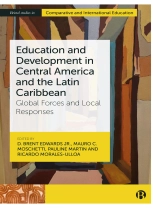Rooted in an international political economy theoretical framework, this book provides unique insights into the global forces and local responses that are shaping education systems in Central America and the Latin Caribbean (CALC).
The book covers all Spanish-speaking countries of the CALC region and examines the effects of macro-economic pressures, geopolitical intervention, neo-colonial relationships, global pandemics, transnational gang networks, and the influence of international organizations. Chapters analyse the challenges and opportunities these global forces present to education systems in the region as well as highlighting the local efforts to address, mitigate, and counteract them. In doing so, the book illuminates how education can contribute to either maintaining or challenging inequalities and exclusion in the face of pressures from the global to local levels.
Tabella dei contenuti
PART 1: INTRODUCTION, CONTEXT AND FRAMEWORK
1. Neglect of Central America and the Latin Caribbean – D. Brent Edwards Jr., Mauro C. Moschetti, Pauline Martin and Ricardo Morales-Ulloa
2. The Political Economy of Education and Development in Central America and the Latin Caribbean: Regional Dynamics & a Framework for Analysis – D. Brent Edwards Jr.
PART 2: CENTRAL AMERICA
3. Comparative Analysis of Education Reform in Central America: El Salvador, Guatemala, Honduras, and Nicaragua—1990-2010 – D. Brent Edwards Jr.
4. Deconcentration of Education in Honduras: Restriction and Ritualization of a Chimeric Reform – Ricardo Morales-Ulloa and Mauro C. Moschetti
5. Locally-Driven Innovation Through Teacher Peer Mentoring in Times of COVID: A Professional Learning Community in Rural El Salvador – Kristin Rosekrans, Celia Morán and Carolina Bodewig
6. Learning Convivencia at School: Lessons on Peaceful Coexistence Policy Enactment from El Salvador – Pauline Martin
7. When Schools Become Gang Turf: Schools and Government-Sponsored Prevention Programs in El Salvador – Wim Savenije
8. Bridging the Curricular Divide: Open Education Resources and the Digitization of Guatemala’s National Basic Curriculum – Matthew Aruch, Felix Alvarado, Rachel Dyl, Michael Lisman, Shue-kei Joanna Mok, Katherine Summers and Kate Maloney Williams
9. Balancing Global Education Policy and Inclusive Education in Costa Rica: Capitalist Pressures, Social-Democratic Tendencies, and Technological Responses – Vanessa Pietras
10. Edtech and Equity in Panama: Mobile Technology for Leveling the Learning Field – Nanette Archer Svenson and Mariana Leon
11. Education as an Antidote to Underdevelopment, and the Epistemicide that it has Entailed – Tobias Roberts
PART 3: THE LATIN CARIBBEAN
12. The Impact of the Opening of the Market Economy on Education and Teachers in Cuba: An Analysis of the Special Period – Changha Lee
13. Contrasting Trends of Low-Fee Private Schools in the Dominican Republic and Honduras: Dialectical Relationships and the Ethos of Privatization – Alejandro Caravaca, Mauro Moschetti, D. Brent. Edwards Jr. and Xavier Bonal
14. Educational Policies on Gender Perspective in Puerto Rico in the Face of the Transnational Anti-Gender Crusade – Loida M. Martínez Ramos
PART 4: CONCLUSIONS AND FUTURE DIRECTIONS
15. The Dialectics of Education and Development in Central America and the Latin Caribbean – D. Brent Edwards Jr.
16. Whither Education and Development in Central America and the Latin Caribbean? Dialectical Reflections, Decolonial Options – D. Brent Edwards Jr.
Circa l’autore
Ricardo Morales-Ulloa is a Professor, Researcher and Director at the Cooperation and Development Institute at the National Pedagogical University Francisco Morazán in Honduras.












